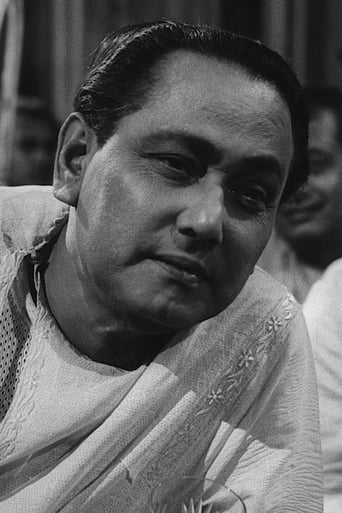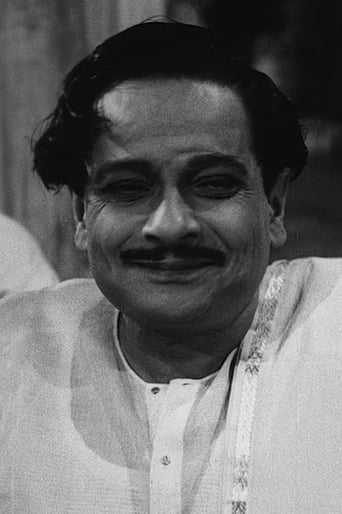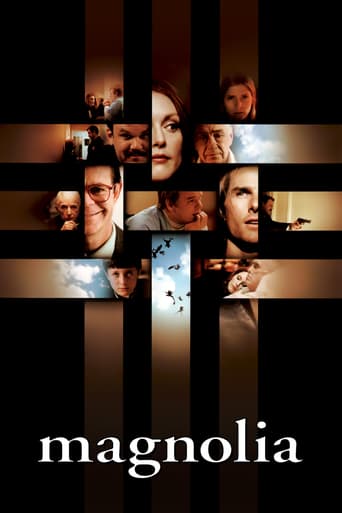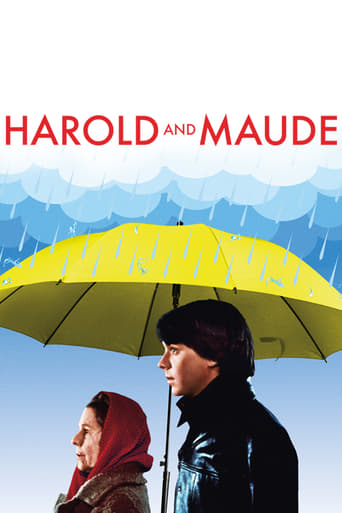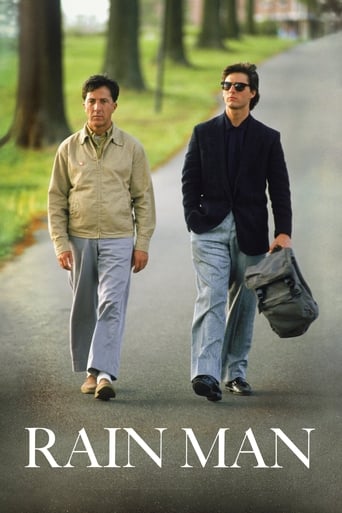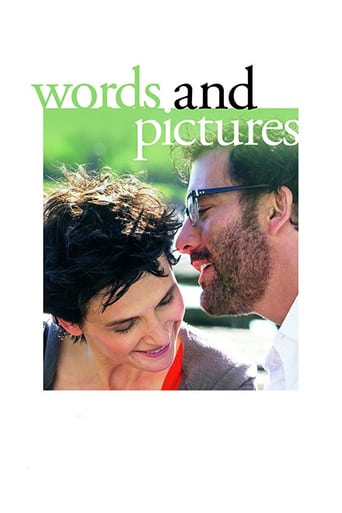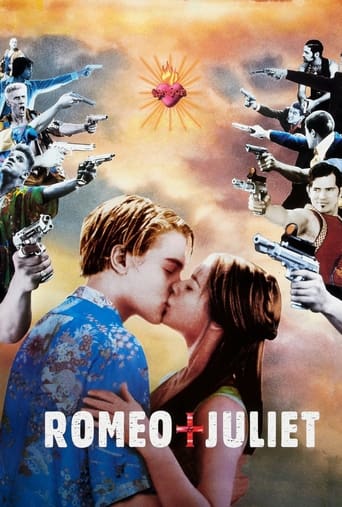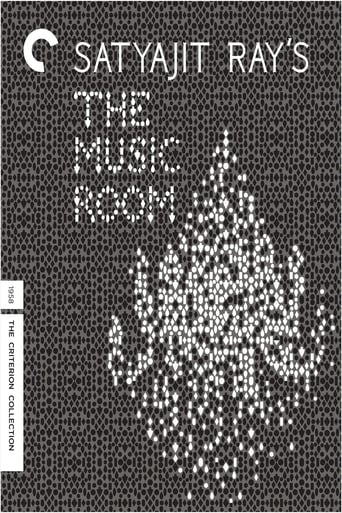
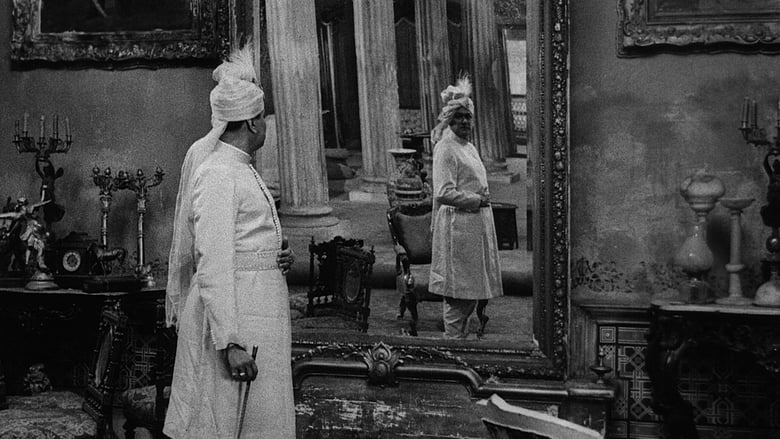
The Music Room (1963)
A wealthy landlord lives a decadent life with his wife and son. His passion – his wife would calls it his addiction – is music, and he spends a great deal of his fortune on concerts held for the locals in his magnificent music room. He feels threatened by his neighbour, a commoner who has attained riches through business dealings. His passion for music and quest for social respect are his undoing, as he sacrifices his family and wealth trying to retain it.
Watch Trailer
Cast


Similar titles
Reviews
I found this Indian Bengali film in the book 1001 Movies You Must See Before You Die, I knew nothing about prior to reading about it, but I was hoping for something worthwhile, directed by Satyajit Ray (Pather Panchali, Aparajito, The World of Apu). Basically Bishwambar Roy (Chhabi Biswas) is a wealthy landowner, or zamindar, who lives in a palace, the decadent manner of his ancestors, with his wife and son and his many servants. His biggest passion, which his wife thinks of as an addiction, is music, and he spends a great deal of his fortune and time throwing lavish parties for the locals to attend concerts to be held in his magnificent music room. His wealth however is dwindling, his lands are being eroded by the local rivers, and he pays for a concert, arranged for his son's coming of age, by selling some of the family jewels. His neighbour Ganguli (Gangapada Basu) invites him to a party at his house, but Roy decides to organise a party of his own, the same day, and it costs him the last of his jewels. Roy's wife Mahamaya (Padma Devi) and son Khoka (Pinaki Sen Gupta) are killed in a storm, he becomes reclusive, and closes his music room. Many years later, he decides to hold one final concert, spending the last of his money, and again to spite and outdo Ganguli. It ends in tragedy when he rides his horse at speed on the beach, deliberately galloping towards a wrecked ship, the horse is panicked, and he falls to the floor, injuring himself, as he bleeds he dies. To be completely honest, I did not follow the full story as it was playing out, concentrating on the subtitles made this difficult I suppose, but I did enjoy the great music and dance routines that went on in the music room, all in all it a reasonable drama. Okay!
Tagore in one of his short stories had written (while describing a husband's desperate effort to hold on to his wife when there was no hope) that when one tries harder to grab on to a fistful of mercury it only flows out more through the gaps of the fingers.I think this same analogy describes this movie perfectly. The old Zamindar tries really really hard to hold on to the lost glory of his family through his music room (Jalsaghar) when there's no hope. He loses everything. He loses his mind. And finally in an act of madness loses his very life.I think, through this movie Ray has brought out something very essential to being a human being: Pride (mixed with false hope) and its power to drive a person insane.One of Ray's masterpieces: will definitely compel you to watch more of Ray's films.
Depicts the end days of a decadent zamindar (landlord) in Bengal, and his efforts to uphold his family prestige even when faced with economic adversity.After the box office failure of "Aparajito", Ray desperately needed a hit film and decided to make a film based on both a popular piece of literature and a film that would incorporate Indian music. It was the first film to extensively incorporate classical Indian music and dancing.For the life of me, I haven't found an Indian film -- classic or contemporary -- that I really liked. The "Apu trilogy" does nothing for me, and Bollywood is a disaster. But "Music Room" may be the first exception... and it is precisely because of the traditional music. The cinematography is really good, but that music!
"The Newsweek" magazine once asked Henri Cartier-Bresson , the great French photographer considered to be the father of modern photojournalism , during an interview to name his favorite film. Bresson replied -" Satyajit's Ray's 'The Music Rom'. An old film but one that made an indelible impression on my mind.""The Music Room" is a film that led to greatness by Satyajit Ray's devotion to a single mood: elegiac. Ray isn't alone in sculpting this great piece. The acting by Chabi Biswas as the crumbling aristocrat Huzar Biswambhar Roy, cinematography by Subrata Mitra and music direction by Ustad Vilayat Khan all contribute immensely. The film adaptation of Tarashankar Banerjee's short story but instead of creating an exact adaptation, Satyajit Ray gave his own spin to the film, making music, rather being an interlude, an integral part of the screenplay. In "Jalsaghar or The Music Room", Ray examines the age-old conflict between the landed nobility and the rich without pedigree, between those who dwell in the past and those who embrace the future. Using the same meticulous, unforced style employed in his celebrated "Apu Trilogy",Ray explores how one man's need for a pampered, sumptuous lifestyle leads inexorably towards his complete ruin. It's a fascinating snapshot of Indian culture in the 1930s, and a cautionary tale about the dangers of an inflated opinion of self-worth.Set in the 1930's with the emerging nouveau rich, Roy is the last in a long of rich patriarchs, stumbling as his estate diminishes but clinging till the end to his refined means. Roy lives in a mansion in the middle of a desert, a symbol of his isolation from encroaching destitute. Roy is frequently filmed alone, as are other subjects (his dog, horse, elephant). The film begins with the elderly Zamindar (landlord) sitting alone, staring blankly in his back garden overlooking a once proud space. He is served by one of his two humble and loyal servants. The story flashes back some 15-20 years to a more glorious time when the younger Huzar, with his young son Khoka and wife Padma (the realist/pragmatist to Huzar's idealism) was the class of his region, hosting luxurious concerts in his home. Huzar's centerpiece, his ivory tower and final refuge from the external reality/realism is the titular music room. The room reflects the Huzar's pride, his heirloom, his inner soul. Ray draws us in spatially, in concentric circles, from the outer oasis, to the backyard pool/yard, to the mansion, to the music room and further yet, the music room's stage. Likewise Mitra's camera often, and nearly always in relation to Roy, dollies inwards toward Roy. The movement not only serves to honor the character and make us feel more empathy toward him, but counterpoints the film's maze-like construction. Chhabi Biswas gives a superb performance as the crumbling feudal landlord. Subrata Mitra's cinematography and music by Ustad Vilayat Khan all contribute immensely to create the atmosphere. " Music Room" is a very visual film -- there are numerous ingenious shots (the insect dying in the glass, the bliss of an elephant being bathed in the river, the joy of the servants reopening the dusty music room, the way the chandelier gets reflected in the wine glass revealing Huzur's states of mind , and the last scene where a spider crawls up the leg of his own portrait) and a stirring dance sequence. The camera movements reinforce the character and highlight film's maze-like construction and Roy being trapped in his past. "The Music Room" remains as a majestic masterpiece of a man's monumental effort to cling to his illustrious legacy and hold his head high when his feet wither.


